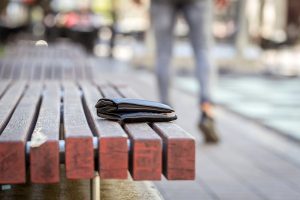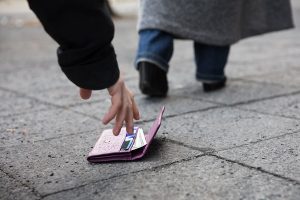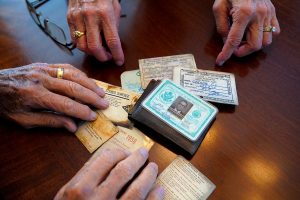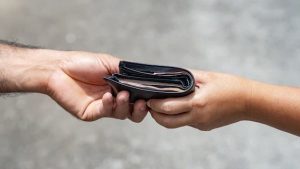lost wallet
Missing Wallets
Reporters from a magazine conduct an experiment.
Vocabulary
| result | potential | lose/lost/lost |
| involve | price tag | equivalent |
| budge | assistant | under budget |
| wallet | came out | what would happen |
| optician | sidewalk | shopping mall |
| coupon | in the end | keep/kept/kept |
| assume | research | maximum |
| slightly | conclude | lost and found |
| gender | honesty | play a role |
| bit (3) | discovery | relative (2) |
| chief | reporter | editor-in-chief |
| editor | situation | experiment |
$9,600 Experiment
$9,600. That was the maximum, potential price tag for the experiment. In the end, it actually came out under budget.
This experiment involved “losing” wallets in sixteen different cities. The sponsor, Reader’s Digest Magazine, wanted to see what people would do if they found a wallet.
The Experiment Set Up
Each wallet contained the equivalent of $50 in the local currency, business cards that included a cell phone number and other contact information, coupons and a photo ID.
At each city, reporters placed 12 wallets in parks, on sidewalks, and near shopping malls. Then they waited for the “fish” to come. Hidden from a distance, they observed and recorded what happened.


The Findings
All the wallets were eventually found by city residents. What happened next varied: the researchers received calls and returns from 47% of the wallet finders; 53% of the other wallets were never heard from again.
The observers noted that off the 102 wallets, one was pocketed by a male Zurich tram driver (his employer runs the city’s lost and found office).
In Warsaw, the seven unreturned wallets had all been kept by women, though the researchers concluded that overall, gender and age were not factors in honesty or dishonesty.
Meanwhile, the one returned wallet in Lisbon, Portugal was done so by Dutch tourists.
Explanations
When the researchers met the returners, they told them about experiment and interviewed them.
They asked a 30-year-old optician’s assistant in Prague why she returned one of the wallets. She replied, “It is something you do naturally.” A 73-year-old grandmother in Rio de Janeiro answered, “Because it is not mine.”
Honesty is Absolute, Definite
“The most surprising discovery for the team at Reader’s Digest is that honesty is not relative,” said Raimo Moysa, editor-in-chief of Reader’s Digest International Magazines. “For almost all the people who returned wallets, it was the only way to act in such a situation.”
A possible exception may have been Ursula Smist, one of the five people who returned wallets in London, said, “If you find money, you can’t assume it belongs to a rich man,” said “It might be the last bit of money a mother has to feed her family,” said Smist, who is originally from Poland.
The Results
The cities and the number of wallets that were turned in are as follows:
11/12 Helsinki, Finland
9/12 Mumbai, India
8/12 Budapest, Hungry
8/12 New York
7/12 Moscow
7/12 Amsterdam
6/12 Berlin
6/12 Ljubljana, Slovenia
5/12 London, UK
5/12 Warsaw, Poland
4/12 Bucharest, Romania
4/12 Prague, Czech Republic
4/12 Rio de Janeiro, Brazil
4/12 Zurich, Switzerland
2/12 Madrid, Spain
1/12 Lisbon, Portugal


Questions
11. Eleven. The hypothesis or underlying idea of the experiment was probably success at recovering lost wallets. Yes, no, perhaps?
12. Twelve. Describe the experiment.
13. Thirteen. All the wallets were returned. Is this correct or incorrect? What were the results?
Fourteen. Was there an irony or paradox of the Zurich tram driver?
Fifteen. Women returned wallets more often then men. Women are more honest than men. True, false, it depends, it doesn’t matter?
Sixteen. Did the returners (people who returned wallets) give reasons why they returned them? What are some explanations?
Seventeen. All cities rated about the same. Is this right or wrong? Are the results surprising, expected, both, in-between?
O. July. If I lose my wallet or purse, I hope someone returns it. Yes or no? Have you or your friends ever lost your wallets?
P. August. If your classmate, colleague, or friend found a wallet, would he or she return it or keep it?
Q. September. How do you think your city would score?
R. October. Would other cities you visited score differently?
S. November. Is this wallet experiment a reflection of trust, honesty, and corruption in society?
T. December. What will happen in the future? Will people and society (and technology) change?
